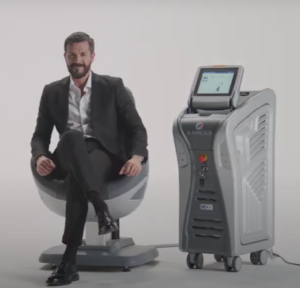Yes absolutely! Most of the time, we only talk about women’s intimate health, even though many men suffer from similar problems. We at A Beauty Light also specialize in men. 40% of our customers are men, so you can feel safe and comfortable with us!
The pelvic floor is made up of several different layers of tissues and muscles. These muscles form a “hammock” that stretches between the coccyx and pubic bone, and between the ischial tubercles. A man’s pelvic floor supports the bladder and bowel. The urethra and rectum pass through the pelvic floor, and the pelvic floor muscles help control the bladder/bowel.
It is the superficial pelvic floor muscles that are active during erection, and which increase rigidity. The key to the effectiveness of the PelviTouch treatment for erectile dysfunction is to normalize the pelvic floor and thus optimize erection.
In men, the pelvic floor can be weakened by:
- Urinary tract/bowel operations
- Constipation
- Overweight
- Heavy lifting
- Prolonged cough
- Physical inactivity
- AgePelvic floor training for men can improve bladder and bowel control and also improve sexual function. It is just as important to be able to relax in the pelvic floor as to have strong muscles.
ERECTILE DYSFUNCTION
Erectile dysfunction is, simply put, a reduced ability to get and keep an erection. This is common and increases with increasing age. This leads to stress and anxiety when it comes to cohabitation because erectile ability is closely related to self-confidence and perception of performance. Most men have difficulty getting or maintaining an erection at some point, and it is more common with increasing age.
The blood flow to the penis must increase about 25 times for a useful erection to occur. This places great demands on the vascular system. Three out of four men with suspected erectile dysfunction have some type of vascular disease. Many of these are diabetics or smokers. In young men with no other 7D picture, the impotence can be psychologically conditioned and have to do with performance anxiety.
The flow of blood into the penis is the decisive reason for the erection, and the fact that the blood remains in the penis and causes swelling/hardness is often related to muscle function. Muscles in the pelvic floor block the return of blood through the veins, and when these are not strong enough, the erection decreases. Pelvic floor training can therefore be the first-line option when it comes to treating erectile dysfunction. Pelvic floor training is also free of side effects and painless, which is an advantage compared to other treatment options.

INCONTINENCE - AFTER DRIP
Many men experience bladder problems such as difficulty emptying completely, dribbling and/or a weak stream. It is defined as the involuntary passage of urine after the individual stops urinating, often even after leaving the toilet. Men can sometimes learn to “milk out” the urethra by stroking from the base of the penis up towards the mouth of the urethra. However, Pelvic floor training has been shown in studies to be more effective in terms of symptom relief than just this emptying massage.
INCONTINENCE - BEFORE AND AFTER PROSTATE SURGERY
There are many different muscles near the prostate, and these can be affected by a removal of the prostate. Muscle function may be reduced and men may therefore have continued problems with urine leakage. These muscles can be trained, but just like muscle training for any other muscle in the body, it can take a while before the results become noticeable. Research shows that pelvic floor training is an effective treatment after surgery, and if it is also started some time before the operation, it can reduce discomfort and make recovery even faster. The leakage of urine often occurs with an increase in abdominal pressure, such as when coughing, sneezing or laughing, as well as with sudden movements such as standing up from a sitting position. It can also be about an increased frequency of the need to empty the bladder.
FAECAL INCONTINENCE
Anal incontinence is a symptom and not a disease. Often there is more than one cause of anal incontinence. Therefore, an examination by a doctor is important. Faecal incontinence means a reduced ability or an inability to control one’s bowel function regarding gas and/or stool. After radiotherapy or operative procedures, it can be difficult for the muscles to recover. If you need to exercise your muscles, our treatment can help you exercise and strengthen the muscles around the rectal opening and pelvic floor.
PELVIC PAIN IN MEN
Pain in the lower abdomen should always be investigated by a doctor. If you are diagnosed with chronic pelvic floor pain or chronic prostatitis, it is a fundamentally harmless state of tension in the pelvic floor muscles. When muscles are overstretched, they create a non-optimal environment for nearby nerves, blood vessels and organs. Near the pelvic floor there are, among other things, the bladder, urethra and rectal opening, which can be affected. Often pain will lead to more pain through a spiral. Overexertion leads to pain, which leads to anxiety, which leads to tension, which leads to more pain…
Pain/heaviness/discomfort from the pelvic floor muscles that create tension can be felt in the perineum, around the anal opening, tailbone penis, testicles, groin, lower abdomen and lumbar spine. Symptoms may include painful ejaculation, premature ejaculation, erectile dysfunction and decreased libido. The problems can also be associated with discomfort when emptying the bladder, increased frequency of needing to urinate and a weak stream. Things that are considered to increase the risk are: prolonged sitting, lack of physical activity, cycling, trauma to the pelvis, weight lifting, sexual anxiety/anxiety and more.
We have programs that can make a difference in both relaxing your pelvic floor and building up and gaining control over the musculature.
TREATMENT WITH DR ARNOLD FOR MEN
During a treatment, you sit fully clothed in the chair for 30 minutes and you can e.g. surf, read a book or listen to a podcast in the meantime. The treatment does not hurt and you can go straight to work or other activities. This treatment suits the vast majority of people and we have programs to both train and strengthen the pelvic floor as well as programs to help you get in touch with your abdomen to be able to relax and reduce pelvic floor pain. The treatment can improve and reduce problems such as incontinence, post-drip, faecal incontinence, erectile dysfunction and pelvic pain.

Who shouldn't try pelvic floor training with Dr. Arnold?
If you have recently had surgery, have a pacemaker or other electronic implant, suffer from epilepsy or have metal implants such as a hip prosthesis in the area.
